The Amish are certainly an interesting community from the outside looking in.
An air of secrecy and their reclusive reputation has led to many questions surrounding their beliefs and religion.
It’s hard to deny some of the obvious ways the Amish differ from other religious groups in North America, but there are some similarities that may surprise you.
Do the Amish believe in Jesus? And if they do, what are their views on the Holy Trinity?
Join us as we answer these questions through a deep dive into the rich religious culture of the Amish community.
What this article covers:
Who are the Amish
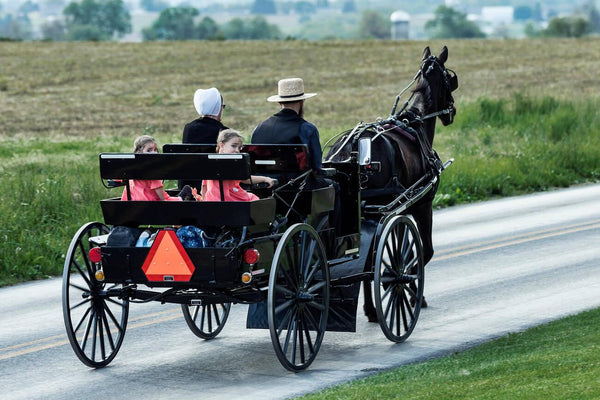
First, let’s talk a little bit about Amish culture in general.
The term “Amish” encompasses more than just a religion for the people who subscribe to it.
The Amish are a deeply traditional Christian community that originated in Swiss Germany.
The largest concentration is based in Lancaster County, Pennsylvania, having migrated there in the early 18th Century, and they still live life in a nearly identical manner as when they first arrived.
The Amish are notoriously protective of their way of life, and one can argue that they have to be. They go to great lengths to maintain their autonomy by staying off of power grids and farming their own lands.
So, why do the amish separate themselves from society?
Encroachment of society on this meticulously-preserved group could be detrimental to their culture.
The Amish steer clear of outside influence to preserve the strength of their beliefs in God and, by extension, Jesus Christ as their Lord and Savior.
So, in short, yes, the Amish do believe in Jesus Christ. In fact, they revere and celebrate him just as much as most other Christian groups do.
Faith and Church
With Amish beliefs in mind, let’s take a look at the traditional Amish church day and the church services.
The Amish hold worship services like most Christian denominations, but their practices differ in several key ways.
Families who are in the Amish communities take turns in holding church services in their homes.
The men and women are separated, sitting on opposite sides of the room while facing one another.
The preacher stands in the middle of the two groups and delivers the message of the day.
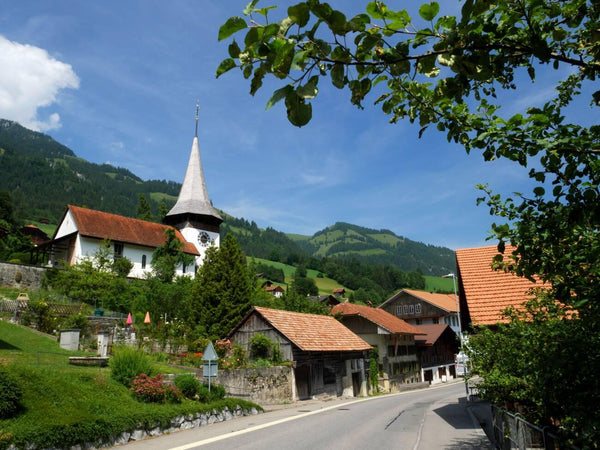
Both ministers and deacons are appointed by drawing lots. The Amish believe this way works best as it’s an Amish symbol of God doing the choosing.
The men who are granted these roles aren’t paid and they hold these positions for life.
Their services begin with a slow gregorian chant of an old German hymn from their husband’s hymnals. This is also their least used language and many Amish struggles to understand it.
Once the hymn is finished, the minister will stand up and preach the Anfang, also known as the beginning message.
When the ministers preach, they aren’t allowed to read from the bible. Instead, they preach from memory.
The message proceeded with a prayer from the prayer book and a reading from the Amish bible.
The preacher will then stand up and preach the main message of the day, also called the Mehre Teil.
The ladies of the service pass around cookies and treats that the younger children can snack on while the message is being delivered.
A few more prayers occur after the main message and are taken directly from their prayer book.
Finally, one more hymn is sung, and the location of the next Sunday service is announced.
Communion
A key demonstration of the Amish’s dedication and belief in Jesus is their observance of the Holy Communion.
In essence, partaking of the Communion is symbolic of the Crucifixion, sacrifice and Resurrection of Jesus Christ.
Like most other Christian churches, members of the Amishchurch receive a piece of bread and place it in their mouths. The bread is chewed, and then they take their seats. Once seated, wine is poured into a cup and each person takes a sip.
However, there are ways in which the Amish partake of the Communion differ from mainstream Christianity.
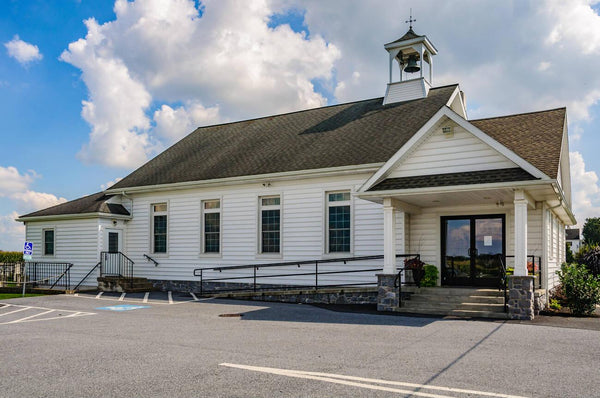
Communion in the Amish community is practiced twice a year. Once in the spring and the other in autumn.
It’s important to note that only those who have undergone Amish adult baptism may partake in communion.
Once the Communion has been observed, members have their hands and feet washed before the service ends.
Sundays
While the Amish do believe in Jesus, and follow many teachings of the New Testament, much of their tradition stems from Old Testament scripture, which predates the life of Jesus Christ.
Amish Sunday typically prohibits work. Instead, the Amish enjoy a biblical day of rest.
The only exception would be farmers and cattle owners needing to harvest crops or milk cows.
It’s a day where Amish women aren’t encouraged to heavily clean around the house or make large meals.
The Amish will usually make a big meal on a Saturday so that there are leftovers for the next day, where they spend the day strengthening bonds as a community in accordance with Jesus’ teachings.
Amish businesses and shopowners close on Sundays so you won’t be able to enter any stores for the day.
After church services, the youth are encouraged to mingle while the parents return home.
During this mingling session, the youth can be seen playing games outside and sharing a meal.
In the evening, they will have a 2-hour singing session where they practice hymns for the next service.
On Sundays when there’s no church service, the Amish are encouraged to read their bibles quietly or visit a neighboring church if you’re wanting to attend a service.
It’s also a day when Amish families visit their extended families and friends.
Lifestyle
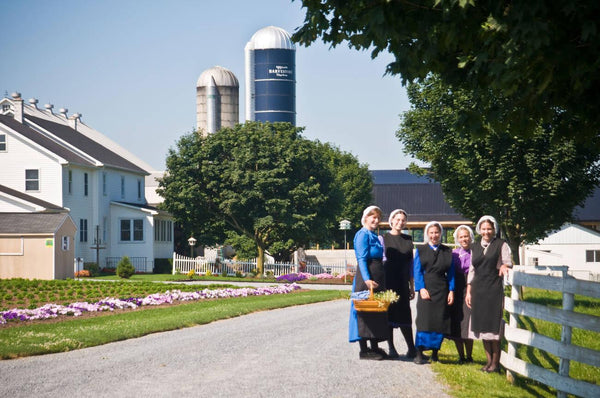
Amish lifestyles seek to emulate the simplicity and devout faith displayed in the bible. In fact, much of the Amish way of life is designed to emulate a life that Jesus would approve of.
The Amish follow the Ordnung, a book containing scripturally based rules and Amish laws that are used to guide them in Christianity.
It dictates the way that the church conducts services, specifies which technology isn’t permitted, and defines the relationship between the community and families.
The Amish people are known for having a simplistic lifestyle while wearing simplistic clothing. While this is usually attributed to their Swiss-German origins in the 17th century, it’s really an attempt at maintaining the simplistic, humble way of life that God and Jesus have set out for Christians to live.
Professions
The Amish derive great joy from hard work and, although they view pride as a sin, they find immense satisfaction in working with their hands and using their labor to provide for their families and the community as a whole.
This isn’t a coincidence. Jesus was a carpenter before he began his ministry, a profession that’s widely considered noble and earnest. The Amish possess a collective desire to emulate this nobility and always strive to avoid the pitfalls of lackadaisical attitudes.
Most Amish men are farmers, providing food for their families and doing handy work around the house.
The Amish have many builders who are willing to lend a helping hand to fellow Amish if they’re in need of a barn or new roof.
Amish women delve into trades and being shopowners, as well as taking care of the children at home. They’re also master craftsmen, having honed the skill of creating magnificent products like bed tray tables, personalized recipe card boxes, wicker bathroom baskets, and even wooden sewing baskets.
In terms of education, the Amish people have their system and schools. Here, children are taught to live a rural life that focuses primarily on manual labor.
Children are also taught to live under and follow God’s word, with failure in doing so leading to shunning.
It’s widely accepted that living a life striving toward the common good of their people is a privilege, and they seek to follow in Jesus’ footsteps of adding value to their community through hard work and harmony.
Do the Amish Believe in the Trinity?
The Amish are orthodox, believing in the Holy Trinity and the deity of Jesus Christ. They believe in one God eternally, existing as Father, Son, and Holy Spirit.
They believe that Jesus Christ is the only son of God and died on the cross for the sins of the world.
The Amish believe in heaven and hell in the afterlife. Heaven is the reward for those who have a strong belief in Jesus Christ and follow the Amish Church’s rules.
Hell is for those who reject Christ as their savior and live as they please, not following Amish traditions or law.
Many Amish practices a work-based relationship with God, meaning that they view their good work as earning favor with God.
They feel that if they have more good works outweighing the bad, God will allow them into heaven.
They believe that God decides their eternal destiny by weighing their obedience to the rules of the church against their disobedience.
According to them, they also believe that the holy spirit convicts them of sin and empowers the Amish to live a holy life.
What Do the Amish Believe About Salvation?
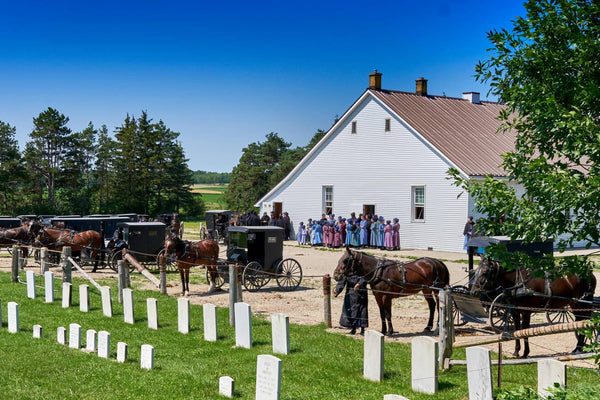
In religion, salvation is referred to as the deliverance of humankind from a negative condition such as evil and sin.
The simplest definition is to be delivered from peril and to be saved by God when faced with sin.
The Amish people speak of a living hope of salvation.
Their version of being born again is referred to as die neugeburt, and it points to a distinctive understanding of Christian salvation.
The Amish view the new birth process as a metaphor for joining the community in a church. This birth can’t take place in isolation.
In John’s gospel, there’s an entire chapter dedicated to new birth.
When die neugeburt takes place, the chapter is read aloud twice each year as part of a sequence of services leading up to communion.
Salvation to the Amish people is a judgment that only God can make at the end of one’s life. This is where their idea of living hope comes in.
A living hope means quiet confidence and reassurance that at the end of their life, God will be merciful and judge.
While the Amish have the belief that salvation is an unearned gift from God, they don’t believe that having faith automatically guarantees it.
Baptism
Amish folk are typically baptized between the age of 18 and 22. It can happen before and after that range but it’s not as common.
Either way, the Amish baptism ritual is necessary for adults in the community, and it’s certainly a requirement if you want to get married in an Amish church.
Amish youth take classes and have meetings with members of the church leading up to the baptisms for 18 weeks.
The class takes place during the Sunday church services, and the lessons are held in a separate venue from the church.
Since the Amish have church every second week, these meetings occur 9 times before the baptism.

Once the candidates are approved, they’re officially baptized two services before the annual autumn communion.
Before baptism, those looking to be baptized are reminded that they are agreeing to a lifelong commitment.
Once they’ve unequivocably agreed to the process, they proceed into the service.
Here, the candidates are asked to kneel, and the church leader reads out commandments that the candidate must agree upon in front of the congregation.
If the candidate has agreed to all the stipulations laid out by the church leader, the baptism can now take place.
The bishop oversees the process and raises the candidate’s head, pouring water onto it three times. This is to affirm their faith in the holy trinity.
The candidates are helped to their feet and the bishop announces them as a member of the church followed by a holy kiss if they are male, and a blessing from the deacon’s wife if they’re female.
Conclusion
Because of the immense focus on their perceived oddities and their estrangement from society, it’s common for mainstream Christians to overlook the Amish’s devout belief in Jesus Christ.
In fact, Amish people hold an incredibly strong belief in Jesus Christ and the Holy Trinity.
Their beliefs and practices are wholly Christian, and their reliance on tradition only serves to strengthen their belief in God, Jesus and the Holy Ghost.
If anything, their commitment to keeping their way of life going should indicate the strength of their beliefs even more!
Did You Find Our Blog Helpful? Then Consider Checking:

